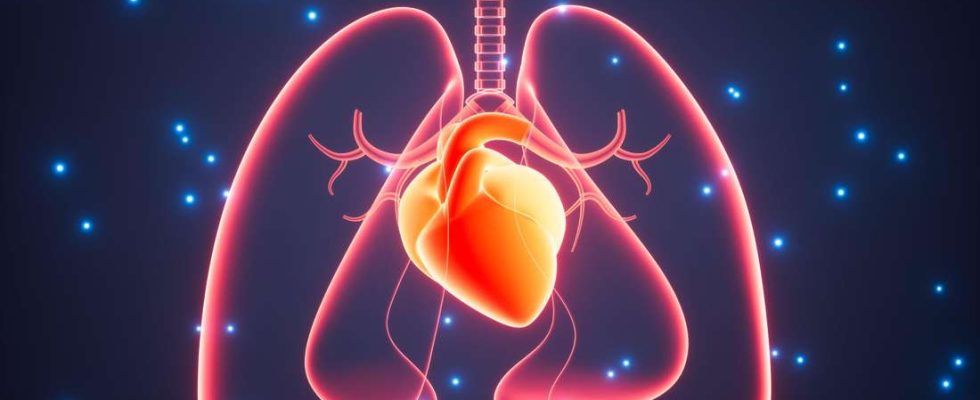Press
According to a study from Sweden, the usual prescription of beta blockers is outdated for mild heart attacks.
Frankfurt – People who have suffered a heart attack are often prescribed beta blockers to prevent another heart attack. Some are supposed to take these medications for a limited time, others for the rest of their lives. Beta blockers have been the standard in medicine after a heart attack for decades. However, new research suggests that their use offers little benefit to patients with less severe heart attacks and normal heart function.
This is particularly relevant given that these preparations are generally considered very safe, but can also be associated with unpleasant side effects such as leaden fatigue, dizziness, depression, weight gain, blood circulation problems in the hands and feet and erectile dysfunction.
Taking beta blockers does not reduce the risk of a second heart attack
According to the in the specialist magazine New England Journal of Medicine published study According to a Swedish researcher, taking beta blockers neither reduces the risk of a second heart attack nor does it affect the mortality rate. The scientists led by cardiologist Thomas Jernberg from the Karolinska Institute in Stockholm recruited 5,020 women and men who had suffered a heart attack for their analysis. 95 percent had been treated at 47 different centers in Sweden, the rest in Estonia and New Zealand.
All had a normal ejection fraction. This refers to how well the heart pumps blood to the rest of the body. If the heart muscle becomes too stiff or too weak after a heart attack, it can no longer pump blood effectively and supply the organs adequately, in this case it is called heart failure. An ejection fraction of 40 to 50 percent is considered normal; for the participants in the study it was 50 percent or more.
Beta blockers are the most commonly prescribed medicines worldwide
Half of them were randomly assigned to receive the beta-blockers metoprolol (the most commonly prescribed drug) and bisoprolol; the other half did not take any of these medications. The study was not blinded, which means that both the participants and the treating doctors knew who was receiving a beta blocker and who was not. The aim was to find out how useful it is to give beta blockers to people with such “small” heart attacks.
Beta blockers are a class of medications that are among the most commonly prescribed medications worldwide. They are given for high blood pressure, atrial fibrillation and other cardiac arrhythmias, for heart failure and after heart attacks, but also for migraine prophylaxis and as eye drops for glaucoma. Beta blockers work by blocking certain receptors and thus inhibiting the release of the stress hormone adrenaline and the neurotransmitter norepinephrine, which accelerate the heart rate. Beta blockers lead to a reduction in the beat rate, which relieves the strain on the heart muscle.
Study shows: Taking beta blockers does not bring any significant benefit
The study took place between September 2017 and May 2023, and after an average of three and a half years, the authors checked how the participants were doing. The result: 3.9 percent of the group of people who had taken beta blockers since their heart attack died, while 4.1 percent of the group who had not received these medications died (all deaths were taken into account, not just those). , which were due to heart problems).
4.5 percent of the beta blocker group suffered another heart attack and 4.7 percent of the other group. There were also no significant differences in the frequency of occurrence of heart failure, atrial fibrillation, stroke or symptoms such as shortness of breath and chest pain. The researchers therefore come to the conclusion that taking beta blockers does not provide any significant benefit for these patients and that they can therefore be spared the potential side effects.
Results “question routine use of beta-blockers after heart attack”
These results, according to a contribution from the American College of Cardiology to the current study, call into question the “routine use of beta-blockers in all patients after a heart attack.” This dates back to a time before the “introduction of many newer procedures for opening clogged arteries”. Due to the options available today, around half of those affected do not end up with heart failure after a heart attack.
The Swedish researchers also point out that most of the studies that showed a benefit from beta blockers after a heart attack were carried out at a time when many of the modern diagnostic and treatment methods commonly used today were not yet available. The damage to the heart muscle used to be greater, study author Troels Yndigegn from the University of Lund (Sweden) is quoted in the article by the American College of Cardiology: “What we are seeing today are more myocardial infarctions, which are smaller and do not affect the heart muscle to the same extent damage”. He therefore assumes that “after this study, many doctors will find no indication to routinely treat all their patients after a heart attack with beta-blockers.”
Guidelines for medication after a heart attack could be changed
The Swedish doctor told the magazine “Medical News Today” that he thought that the guidelines would now be changed and beta blockers would no longer be recommended for patients with normal heart function after a heart attack. However, he also emphasizes that “evidence continues to support beta-blockers for patients with large myocardial infarction and heart failure.”
Cardiologist Bashar Al-Hemyari from the University of Texas confirmed his Swedish colleague’s assessment to the US medical journal “Health”. The study shows “that beta-blocker therapy should not be generally prescribed to people who have suffered a heart attack.” Instead, it should be administered individually “after weighing up the benefits and risks.” (pam)

